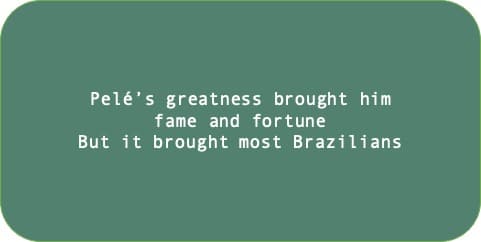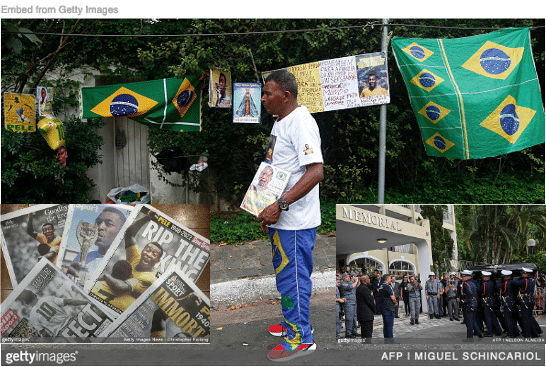
Pelé, the GOAT
Legacy and social media are replete with people eulogizing Pelé. And they are all saying practically the same thing. It’s some version of this:
Pelé, the Brazilian soccer legend who won three World Cups and became the sport’s first global icon, has died at the age of 82. …
For more than 60 years, the name Pelé has been synonymous with soccer. He played in four World Cups and is the only player in history to win three, but his legacy stretched far beyond his trophy haul and remarkable goal-scoring record.
(CNN, December 29, 2022)
Millions have already said all there is to say about Pelé, the soccer player. I have little to add. But I have lots to say about Pelé, the man.
Of course, debates about the “greatest of all time” are common in sports circles. But Pelé could be forgiven indignation at even being the subject of such debates. Argentine Diego Maradona, Lionel Messi, and fellow Brazilian Neymar are great. And Cristiano (Narcissus, MeToo) Ronaldo is the most popular player on social media. But he does not even rank among the greatest players on the pitch.
Meanwhile, Pelé’s humility off the pitch is as legendary as his play on it. So he always dismissed this debate with a humble brag. He sufficed to say he’s the only player leading his national team to 3 World Cup titles. Pretenders Maradona and Messi led their teams to only one title, respectively. And Neymar has not even managed that.
So be wary of anyone hailing Pelé as “one of the greatest” soccer players of all time. Because that’s every bit as absurd as hailing Ali as one of the greatest boxers of all time. He’s the GOAT!
Why did Pelé fail as a presidential candidate?
Every Brazilian is eulogizing Pelé as their “king.” But most Brazilians deemed him unfit to serve as their president. Yet they elected Jair Bolsonaro, the demagogue. He took foolish pride in calling himself the “Trump of the Tropics.”
‘To be a candidate after (Fernando) Collor de Mello is a challenge that I would like to accept … to be able to aid the Brazilian people; I have no reason to start lower than this (the presidency),’ Pele said.
(UPI, October 13, 1990)

Pelé had unrivaled fame. He had spent decades playing Brazil’s roving ambassador on soccer pitches worldwide. So he had every right to expect a coronation after announcing his candidacy.
Instead, Brazilians told him, in effect, he was getting too big for his britches. And that, like all Blacks, he should know his place. A humbled Pelé settled for a stereotypical role. He became the sports minister in the 1995 government of Fernando Henrique Cardoso.
Granted, this was nothing compared with the backlash and imprisonment Muhammad Ali suffered. And he merely refused, on religious grounds, to be drafted to fight in Vietnam. Still, it’s easy today to overlook how limiting Pelé must have found his fame.
His fame did little to help the poor
More children are living in Favelas today than when Pelé became famous. Most of them are poor and Black. And they are growing up the way he did.
Favella is a slum or shantytown located within or on the outskirts of the country’s large cities, especially Rio de Janeiro and São Paulo. … The lack of infrastructure gives rise to improvised and jerry-rigged plumbing and electrical wiring.
Often water must be ported great distances, and rudimentary methods of waste disposal pose health hazards. As a result of the crowding, unsanitary conditions, poor nutrition, and pollution, disease is rampant in the poorer favelas, and infant mortality rates are high.
(Britannica)
The distance between where Pelé came from and what he became couldn’t be greater. The way favela-dwelling Blacks protested the 2016 Rio Olympics dramatized this. They voiced resentment over the government spending billions on sports facilities.
After all, they remained mired in perennial squalor. I suspect the shame their protests represented sickened Pelé. And this might explain why he did not emulate Ali by lighting the torch at the Opening Ceremony.
No time to die Vivienne
The BBC is showing Pelé more respect in death that it ever did in life. It’s providing wall-to-wall coverage of eulogies to him. And it’s so committed; it dissed fashion icon Vivienne Westwood. The BBC ended up announcing her death in his reflected glow. You know, like an innocuous TV commercial during half-time of a World Cup final match.
Alas, Westwood will have public eulogies to her washed away – into the dustbin of history – by the wave of those to Pelé. Just as Farrah Fawcett saw hers washed away by those to Michael Jackson when she died on June 25, 2009, the same day he did.
Farewell, Pelé